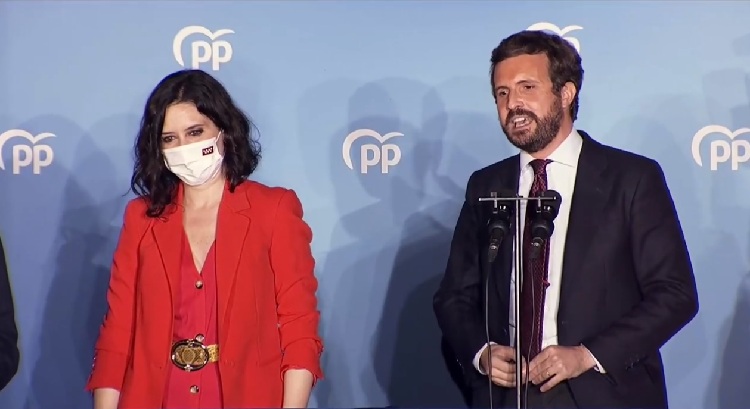Ángel Collado
The determination of the national leadership of the PP to prevent the president of the Community of Madrid, Isabel Díaz Ayuso, from becoming the regional president of the party like the rest of the regional leaders is beginning to take its toll on Pablo Casado.
While the internal crisis of the Popular Party makes it difficult to echo its work in the opposition, all the electoral polls for December register a decline in the PP’s expectations and a rebound of Vox, which, by further dividing the right-wing vote, shores up Pedro Sánchez’s current majority with the extreme left of Podemos plus its nationalist and separatist partners.
The internal problem remains entrenched in the Partido Popular three months after Díaz Ayuso openly raised his aspirations to run for the regional presidency of the party and requested the convening of a congress. Casado’s team still refuses to give in and rejects that it is time to consult the militants and elect a new leadership despite the fact that it has been almost five years since the previous congress. The current president, Pío García-Escudero, has been in office on an “interim” basis since May 2018.
Casado has let the year end without admitting the celebration of the assembly or setting a date to do so in the next year, while his loyalists insist that they will do everything possible to stop Díaz-Ayuso. Relevant manoeuvres include, if necessary, throwing the mayor of the capital, José Luis Martínez-Almeida, into the fray for the post of president of the Madrid PP.
The closest thing to a truce in recent days has consisted of Casado’s refusal to speak more about the matter in public while the president of the Community did the same while waiting for the national leadership to clarify its position. Despite this official silence, in the meetings and first pre-Christmas dinners of PP militants in different districts of Madrid and cities in the region, there has been evidence of the closed support of the party’s rank and file for Díaz Ayuso.
The president of the Community of Madrid had to attend up to three dinners in the same day in order to respond to the requests of the local organisations of her party. The national headquarters gave instructions last Friday to suspend these types of meetings throughout Spain in view of the increase in Covid infections, despite the fact that Madrid is one of the three regions with the lowest incidence and is not yet above medium risk.
And while support for Díaz Ayuso in the Madrid PP is growing, Casado’s support is falling in the polls for the first time since his victory in the Madrid regional elections last May. In the last two polls published, the main opposition party has seen its expectations slow down to a dead heat with the PSOE, already only one point ahead of the socialists in the most favourable study and almost three points behind in the most negative one.
As Vox rises at the same rate as the PP falls, the main beneficiary is Pedro Sánchez because the right-wing as a whole is moving away from an absolute majority, which would allow the President of the Government to re-edit his coalition with the entire parliamentary far left, independentists and nationalists, even without the need to be the most voted in the elections.
If the internal fight in the PP penalises Casado in the polls, it also harms the party’s options before the next appointment with the polls such as the regional elections in Andalusia scheduled for June or September next year, according to the forecasts of the current regional president, Juan Manuel Moreno.
The president of the Andalusian regional government himself, president of the Andalusian PP like the rest of the party barons who combine both positions, had called for the conflict originating in Madrid to be resolved as soon as possible, but he will be forced to run in the elections with the crisis opened by the national leadership. Moreno has had to announce the early elections after Vox joined the left-wing parties to overthrow the Andalusian government’s draft budget.
The party headed by Santiago Abascal, focused on expanding its electoral space at the expense of the PP, is now trying to take advantage of the internal crisis of the Popular Party after the setback suffered in the regional elections in Madrid. On 4 May, Vox’s hopes for growth were put on hold by Ayuso’s success in winning the votes of practically the entire centre-right in Madrid: he won 44.7 per cent of the PP’s votes compared to 9 per cent for the extreme right. In the 2019 general elections, Abascal had reached 18 per cent of the votes in the Madrid constituency.
Casado’s internal operation to stop Ayuso has so far resulted in a reversal for the PP: a setback in the national polls and a resurgence of Vox which, in Andalusia, in view of next year’s elections, threatens Moreno’s comfortable victory, which seemed certain.






